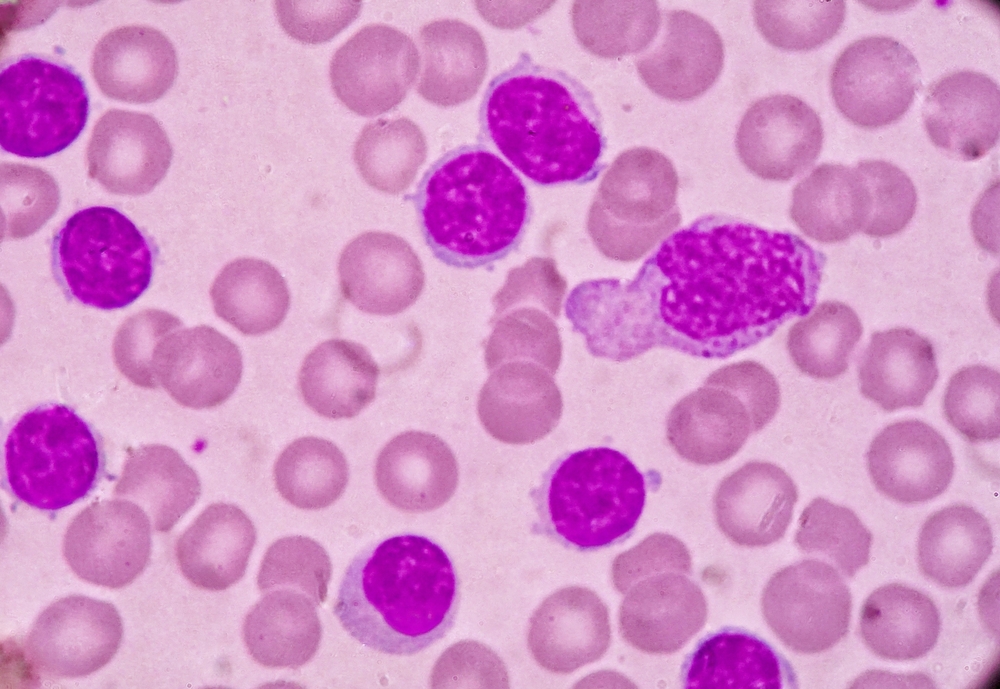
New data indicate that MS-553, an inhibitor of protein kinase C-β (PKC-ß), inhibited BCR signaling in vitro and in patients with chronic lymphocytic leukemia (CLL). Jyotsana Singh, PhD, of the University of Texas MD Anderson Cancer Center in Houston, presented results from the investigation of MS-553 at the 65th ASH Annual Meeting and Exposition.
According to the researchers, “B-cell receptor (BCR) signaling pathway inhibitors and B-cell lymphoma-2 (BCL2) antagonist venetoclax have transformed the treatment of CLL, including in high-risk patients with 17p deletion and/or TP53 mutations and complex karyotype. Despite the durable remissions observed with inhibitors of Bruton’s tyrosine kinase (BTK), a significant proportion of patients develop resistance with acquired mutations in BTK and its downstream target phospholipase Cγ2.”
However, patients who eventually progressed on BTK inhibitors will progress on both of these drugs, highlighting the need for new treatments.
Dr. Singh and colleagues tested MS-553, focusing on combination strategies in samples taken from patients with CLL, including some with relapsed or refractory disease.
From their experiments, the researchers drew several findings. First, they showed that the CLL cells in contact with stroma upregulated PKC-ßII, its immediate downstream effectors pGSK and pERK, and ß-catenin, including in samples from patients with TP53 mutant disease and 17p deletions.
Next, the researchers found that exposure to MS-553 reduced levels of p-PKC-ßII, pERK, and pGSK in a dose-dependent manner. Finally, pre-treatment of stromal NK.Tert cells with the investigational drug prevented upregulation of PKB-ßII within adjacent CLL cells, showing that stroma is a major source of PHC-ß activation in CLL cells.
In addition, the researchers tested whether MS-553 could inhibit PKC-ß signaling in CLL cells exposed to phorbol myristate acetate, simulating BCR activation. Indeed, this exposure caused downregulation of BTK effectors, BCL2 family member proteins, and ß-catenin. Additional experiments also showed synergy with venetoclax.
The researchers then exposed CLL cells to MS-553, venetoclax, or a combination of the two. Threefold and ninefold increases in mitochondrial dysfunction were seen in stromal-supported wild-type and mutant CLL, respectively, in the group treated with MS-553 compared with the group treated with venetoclax plus MS-553. These findings were validated in CLL samples taken from four patients on MS-553 therapy.
“Overall, our data provide clear evidence that MS-553 inhibits BCR signaling in vitro and in patients on MS-553 therapy,” the researchers concluded in their abstract. “It also provides a rationale for combinations with venetoclax as a treatment partner based on its ability to increase survival dependence on BCL2.”
Reference
Singh J, Sanchez JR II, Liu C, et al. MS-553 therapy inhibits BCR signaling and increases survival dependence on BCL-2 in BTK-inhibitor resistant CLL. Abstract #2283. Presented at the 65th ASH Annual Meeting and Exposition; December 9-12, 2023; San Diego, California.






 © 2025 Mashup Media, LLC, a Formedics Property. All Rights Reserved.
© 2025 Mashup Media, LLC, a Formedics Property. All Rights Reserved.